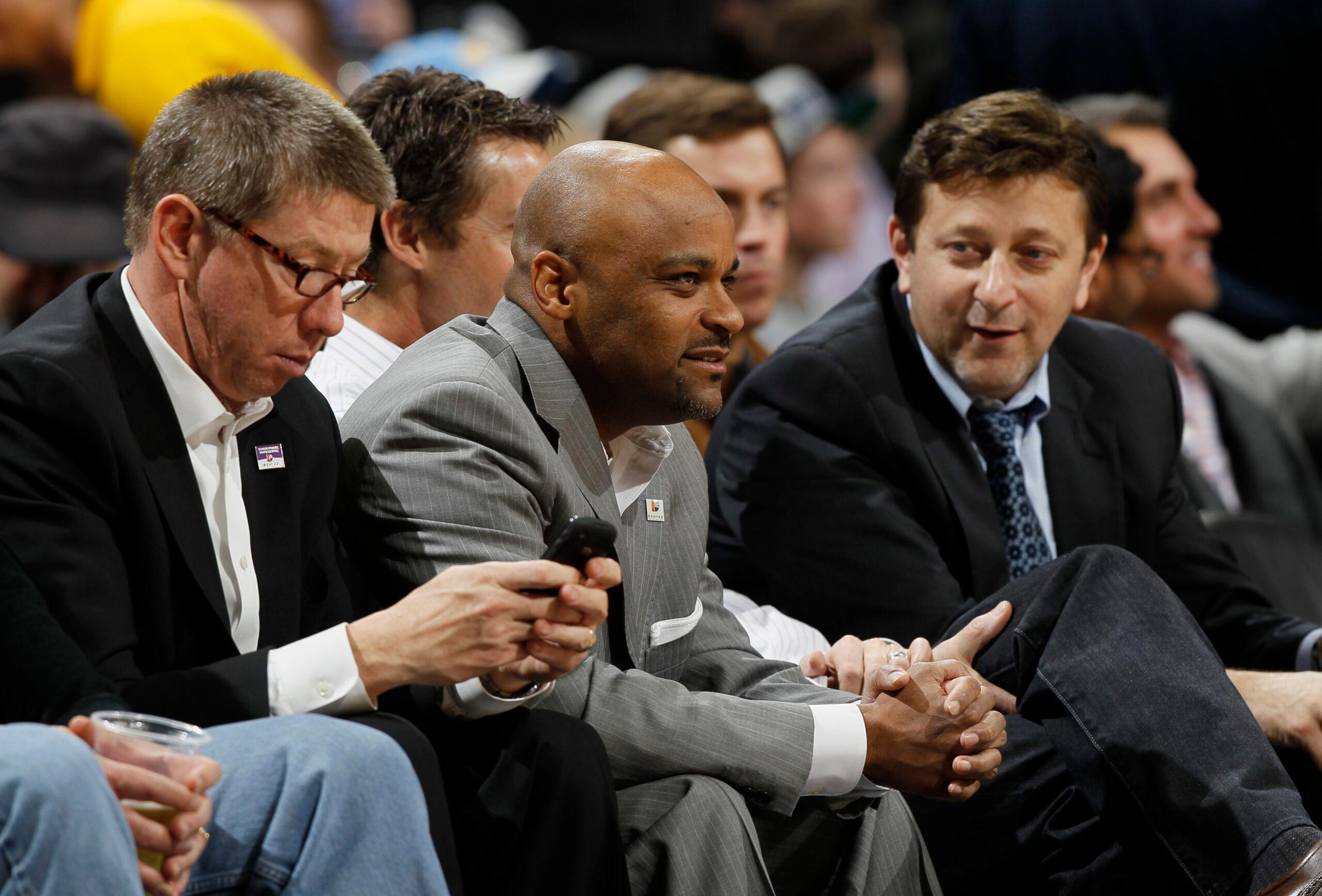
Editor’s Note: CPR News has spent months talking with teenagers, parents, doctors, advocates, researchers, political figures and others. We’ve looked through once-secret internal industry documents released by tobacco companies and listened to many hours of city council and legislative debate. What we found is that the conversation about tobacco products, especially flavored ones like menthol, is not only about nicotine’s deadly effects or the impact on local economies. It’s about ethics, optics and equity.
In his 12-year tenure, Denver Mayor Michael Hancock used his veto power just twice. He refused to lift the ban on pit bulls in the city, and he struck down a plan to forbid the sales of flavored tobacco, including menthol.
The tobacco fight drove a contentious debate with passionate testimony on both sides. Hancock insisted the issue should be handled at the state level and that he wasn’t going to tell Denver retailers they couldn’t sell products consumers could easily buy by crossing into a neighboring city.
With Hancock’s tenure ending on Monday, July 17 and Michael Johnston about to assume the office, backers of the flavored tobacco ban are pushing for the Denver City Council to take it up again. Johnston said on the campaign trail that he is open to revisiting it.
If that happens, though, there will be a new twist. A key lobbyist for one of the tobacco companies that pushed for Hancock to veto the ban now sits on the board of directors of Denver Health — Colorado’s flagship safety net hospital.
In his final year as mayor, Hancock made the largely unnoticed appointment, nominating friend and influential political figure Doug Friednash, a lobbyist with powerhouse firm Brownstein Hyatt Farber Schreck, to that position. The City Council approved the pick with little fanfare.
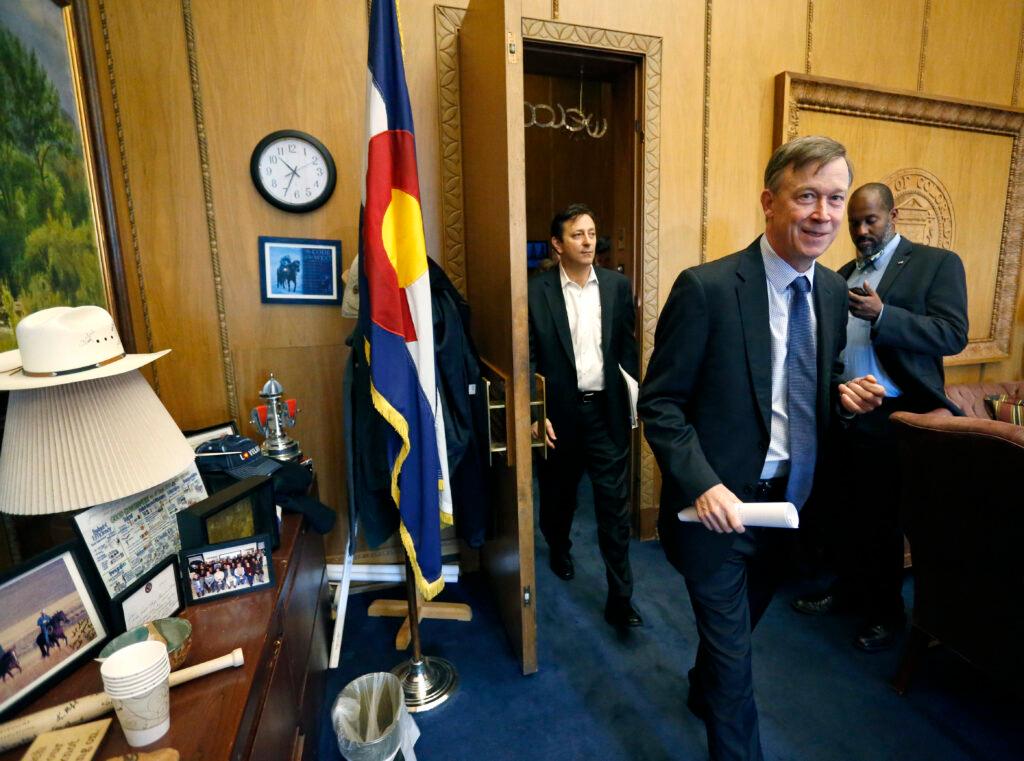
The board was frequently reminded it was “the mayor's appointment,” said Dr. Irene Aguilar, a former state lawmaker who served on the board at the time, as well as its nominating committee. Friednash was known as Hancock’s former city attorney, a former chief of staff to Gov. John Hickenlooper and opinion columnist for the Denver Post.
Friednash chairs the firm’s state and local legislation and policy group. In that role, he serves as a “connector for his clients, bridging the gap between the private sector and all levels of government from Colorado to governors' offices across the country and on to Washington,” according to his bio on the Brownstein website.
The city’s online application for boards and commissions makes no requirement to give specifics about an applicant’s background, other than providing a resume or biography and agreeing to a background check.
To the question “Is there anything that would adversely affect public confidence in your appointment or service?” Friednash checked “No.”
The biography Friednash provided didn’t name any of a long list of his clients, including one of the world’s largest tobacco corporations: Altria, formerly known as Phillip Morris. Another client not listed was the city itself, for which Friednash lobbies in the nation’s capital. Denver has paid his firm $370,000 to lobby in Washington since 2020, according to Opensecrets, a nonpartisan nonprofit that tracks money in U.S. politics.
Friednash’s first character reference on the application form for the board position was Hancock himself. Among the applicants Hancock didn’t pick were a pair of medical doctors, an employment law attorney and the CEO of a national program serving first-time moms and their children living in poverty.
Friednash was paid by Altria to lobby against the city's proposed ban on flavored tobacco, a policy actively supported by Denver Health. Work by Friednash and his lobbying firm made an impact before he joined the 11-member board, by helping to defeat the flavor ban and a similar measure that failed in the state legislature.
These unlikely alliances do not break any laws and, certainly, Denver’s mayors can appoint whomever they please to high-profile, powerful positions. But hospital governance experts and people who closely watch tobacco reform efforts say that it crosses a line.
“He's on a health board?” said Dr. Terri Richarson, a supporter of the tobacco flavor ban, when she learned Friednash was on the hospital’s board. “Honestly, I see that as a contradiction.”
Cigarette smoking is the nation’s leading cause of preventable death and disability, according to the U.S. Centers for Disease Control and Prevention. For years, Richardson worked as a primary care physician and cared for a diverse group of patients, including smokers who developed cancer, at Denver Health’s Eastside Clinic.
'I do not see it as a conflict'
Hancock declined multiple interview requests from CPR about the appointment of Friednash. He did agree to an interview with Denverite’s Kyle Harris about his legacy as mayor.
Hancock said he had “tremendous respect and appreciation” for Friednash, who he said “wanted to be on the board, not because of tobacco. He never even mentioned tobacco.”
“I do not see it as a conflict. I don't think he sees it as a conflict. Denver Health doesn't see it as a conflict,” Hancock said. ”He’ll bring great value to Denver Health.”
Friednash declined CPR’s request for an interview. His firm provided a statement that said it works to help policymakers understand how laws and regulations could impact its clients and that the firm backs its employees' volunteer work.
But national experts on hospital leadership said the pick didn’t make sense.
“If I'm involved in a business, which is inconsistent with the mission of the hospital, why am I on that board?” asked Jamie Orlikoff, president of Orlikoff and Associates, a consulting firm that specializes in health care governance. “Is it to gain legitimacy for what I do, is it to gain information that will help me in my lobbying efforts to push for things, which are inconsistent with the mission of the hospital?”
Hancock scoffed at the suggestion that a Denver Health board member who lobbies for tobacco might have divided loyalties or be privy to inside information about public health policies regarding tobacco.
“I think it's completely off the mark,” Hancock said. The mayor added that sitting on the board would only give someone “the same information you and I get when we look at the side of a pack of cigarettes, as hazardous to your health, period.”
The chair of the Denver Health board of directors, Pia Dean, said the board knew that Friednash was a lobbyist but did not know one of his clients was Altria, which is now investing billions in alternatives to traditional cigarettes, like vaping, as cigarette smoking rates drop.
Dean said Friednash’s lobbying work is not a disqualifier to be on the board, and Friednash has done nothing to undermine the hospital’s role as a public health leader in getting people to quit tobacco.
When asked if she wished she knew Friednash’s client list at the time he was appointed, Dean said the focus was “to bring diversity of experience and qualifications to the board,” and that the nominating committee looks to a candidate's commitment and ability to serve Denver Health.
'It's a balancing act'
But an expert who played a role in helping create the legal structure of the Denver Health and Hospital Authority decades ago takes issue with the appointment.
“Absolutely not. Can't imagine what they were thinking,” said Larry Gage, who founded the National Association of Public Hospitals (now America’s Essential Hospitals) in 1981 and served as its president for 30 years. Gage is now a senior counsel at Alston & Bird in Washington, D.C.
Gage said it’s one thing if the law firm of a hospital board member represents many clients. But things get sticky if a member stands to personally profit or is directly involved in an activity at odds with the hospital’s core purpose.
“It's a balancing act,” said Gage, who has organized and served as a chair for nonprofit boards, and written about board governance. “The statutes, unfortunately, really only deal with financial conflicts.”
Last year, Friednash was paid about $300,000 to lobby for two dozen clients, including Altria, at the state Capitol, according to filings with the Colorado Secretary of State.
Since 2019, Altria has paid him more than $90,000 to lobby state policymakers on its behalf. Lobbyists aren’t required to file similar details with Denver’s city clerk.
Documents obtained by CPR from public records give a window into Friednash’s role in lobbying to defeat the city’s proposed ban on flavored tobacco.
On Aug. 11, 2021, Friednash and Hancock met at 5:30 p.m. for a half an hour. It was the mayor’s last meeting on the calendar that day; the mayor’s calendar is part of the public record.
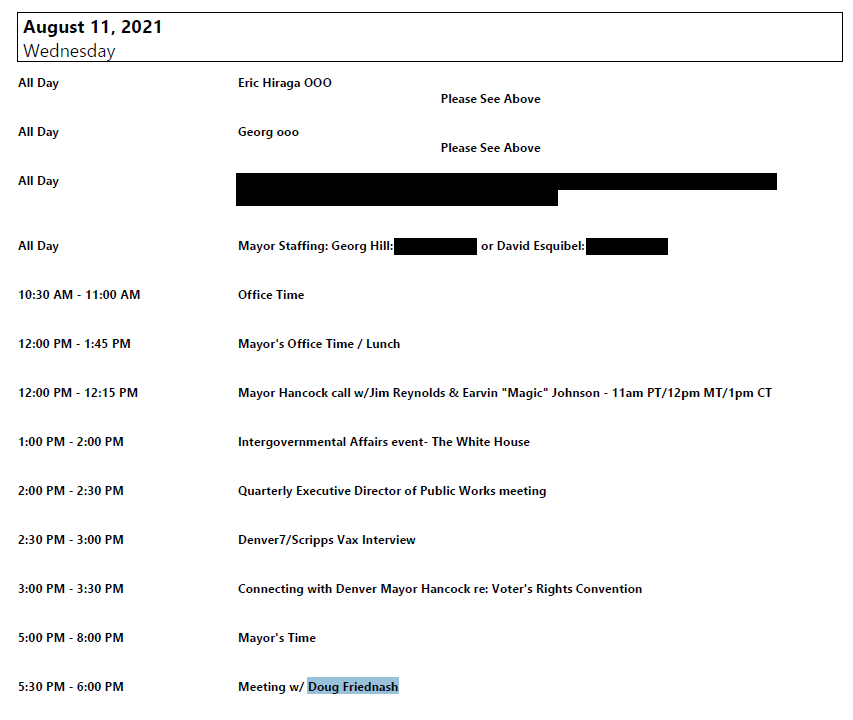
In their statements, neither Hancock nor Friednash addressed the meeting, and it’s unclear what was discussed or whether it was related to the tobacco flavor ban.
Friednash filed with the city clerk a lobbyist bi-monthly disclosure report for Oct. 27, 2021, listing Denver City Councilmembers Kevin Flynn, Paul Kashman, Amanda Sandoval, Amanda Sawyer, Jamie Torres and Robin Kniech. Under each name a note says: “Discussion re proposed tobacco flavor ban.”
The City Council held a committee meeting where the issue was discussed that day. Torres said council members did not meet with Friednash individually.
In early December 2021, the council ultimately backed the flavor ban 8 to 3, but Hancock vetoed it.
“I made the decision based on the facts,” he said.
The council failed by a single vote to override the veto.
Friednash is not the only lobbyist with ties to big tobacco sitting on the board of a major health care provider. The influential and powerful founder of Friednash’s firm, Norman Brownstein, has served on the board of National Jewish Health, one of the nation’s top respiratory hospitals, since 1976.
The firm has lobbied for tobacco interests at least as far back as 1987, according to the Truth Tobacco Industry Documents, an archive of 14 million documents released as part of a multi-state legal settlement.
Denver Health has two boards. The board of directors deals in hospital operations and the Denver Health Foundation board is the hospital’s fundraising arm. Josh Hanfling, another lobbyist, who represented R.J. Reynolds during the fight over flavored tobacco in Denver, chairs the foundation’s board, of which Friednash is also a member.
Both Denver Health and National Jewish Health were part of a coalition of more than 100 health, education and community groups that backed the flavored tobacco bans in Denver and the legislature. Their doctors testified in favor of the ban; the hospitals were featured in a full page newspaper ad in The Denver Post.
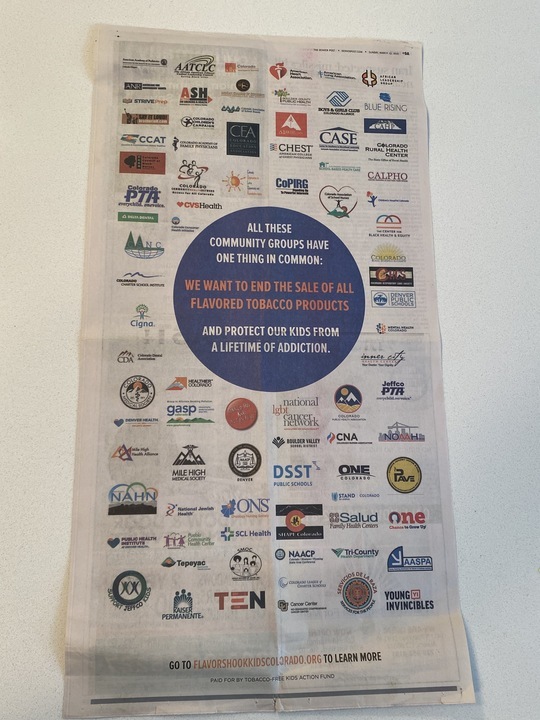
Friednash and Brownstein declined to comment about their positions on hospital boards.
The firm sent a statement for both, which said, “Brownstein Hyatt Farber Schreck is a bipartisan firm that represents clients across a variety of industries.”
The firm said it “supports our employees’ efforts to positively impact the communities in which they live and work, through volunteerism, philanthropy and community engagement.”
“We have no concerns,” National Jewish Health board chair Steve Kris said when asked about Brownstein’s longtime position on the board and the firm’s years of work representing tobacco interests. He said any conflicts of interest are handled through the board’s policies and procedures.
Hanfling declined to discuss his dual roles. “I don't talk about my clients typically, publicly and with the media,” he said. “It's just not something we do.”
Shaping Denver Health's board
Hospital boards play a key role in things like strategic planning, financial oversight, risk, quality and compliance, CEO supervision, performance and succession planning, and governance, according to the American Hospital Association.
In some parts of the country it’s not uncommon for someone with tobacco connections to sit on a hospital board. But it tends to happen more in the southeast U.S. “where tobacco is more a part of the economy,” said Orlikoff, the consultant specializing in hospital governance.
Dr. Irene Aguilar, a former state Democratic lawmaker, worked at Denver Health for more than two decades as a primary care doctor. She said the committee selecting new board members for Denver Health did interview Friednash, and he strongly pledged his commitment to the hospital and providing care for all. But she said there was no talk of his work as a lobbyist or which clients he represents.
Aguilar said that she didn't know that Friednash lobbied for Altria. She was no longer on the board, whose members are unpaid, by the time Friednash joined.
She said normally the mayor would pick prospective board members from a list the committee recommended. But 2022 was different. Of the people on the list they submitted, just one name was picked out of four or five, according to a spokesperson with Denver Health.
Aguilar’s sense was Hancock wanted to shape the board with his mayoral term ending soon. “Basically, they were just his friends and they wanted to be on the Denver Health board for some reason, and this was his last opportunity,” Aguilar said.
In August 2022, Denver City Council took up the Denver Health board nominations of five prospective members that included Friednash. They voted the slate through unanimously.
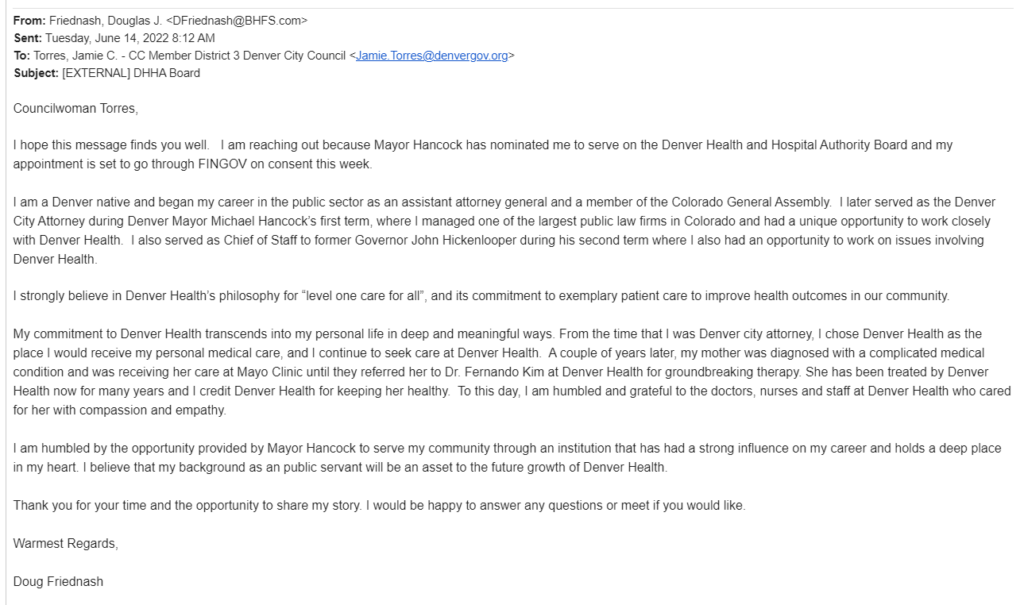
“Doug’s lobbying work never came up,” said Councilwoman Jamie Torres, now the council president. An email Friednash sent to Torres before the vote made no mention of his lobbying work or clients, only his work in the public sector. “That probably is a pretty big failure in just transparency.”
She said the City Council generally OKs appointments from the mayor, unless any problems or conflicts come to light.
Records of Denver Health board meetings after Friednash joined show members discussing a variety of routine and emerging issues, like staffing, finances, treating COVID-19 and monkeypox, and providing care for recently arrived migrants.
Tobacco-related matters haven’t been on the agenda, and Friednash hasn’t pushed it, according to board chair Pia Dean.
But others wonder about more subtle impacts. Would a clinician speak out publicly about tobacco if “the person who is on the other side potentially is my boss's boss?” asked Dr. Suhas Gondi. He’s an internal medicine physician at Brigham and Women’s Hospital in Massachusetts and co-authored a study on the backgrounds of board members at top U.S. hospitals.
He said it would feel less good as a health provider to come to work knowing a leader at the top of the organization was “profiting off of something that I’m trying to treat.”
Gondi said it would be controversial if a similar situation were to arise at his Boston hospital. “I’d hope we’d be protesting,” Gondi said. “There could really be a ground swelling of clinician-led protest.”
'That sounds like a classic conflict of interest'
Hancock insisted any problems would be avoided by Friednash not taking part in any board discussions involving tobacco. “I have no doubt in my mind that Doug will recuse himself if he felt like there was an ethical conflict,” the mayor said.
But the question goes beyond recusal and comes down to optics, said Elena Marks, a national health policy expert at Rice University in Houston.
“That particular example seems really outrageous,” she said. “That's just sort of gross that you're promoting tobacco and you're part of the public hospital system.”
Denver Health serves a quarter of the city’s population each year and a third of Denver-area children. As Colorado's primary safety-net hospital, Denver Health has provided billions of dollars in uncompensated care since its founding, including $120 million last year. The hospital also operates daily tobacco cessation clinics.
“Part of (Denver Health’s) core mission is smoking prevention, smoking cessation,” Marks said. “So that's really profound that they would have somebody who's a tobacco lobbyist (on the hospital’s board). That sounds like a classic conflict of interest.”
“I think it’s dreadful,” said Dr. Phil Corsello, a veteran of the state’s battles over tobacco.
Corsello, a retired pulmonologist at National Jewish Health, was part of the fights over smoking reform and clean indoor air rules in the 1970s and ‘80s. That national movement eventually won sweeping changes like getting cigarette smoking banned on domestic U.S. airlines. In 2006, Colorado lawmakers passed the Clean Indoor Air Act, which banned smoking in all bars and restaurants.
“I do have an understanding of how hospital boards work and how they can be influenced,” he said. “I think that's a devil's bargain. And I think if the tobacco industry didn't believe that having a voice on the board was in their best interest, they wouldn't be doing it.”
Altria declined CPR’s request for an interview. It sent a statement, saying that participating in the democratic process is key to its business. “Altria engages with policymakers at all levels of government. We engage to share who we are, where we are headed and the vital role legislation and regulation play in shaping the future of our industry.” It referred specific questions about Friednash and Brownstein back to the firm.
Since he was appointed to the Denver Health board last summer, Friednash has been absent for half of its meetings between August and May, including five of six between November and April. That’s according to minutes posted on Denver Health’s website. At a meeting in January, he was named as a member of its nominating and governance committee.
Editor’s Note: National Jewish Health is a financial supporter of CPR News but has no editorial influence.
Clarification: This story has been updated to reflect the Denver City Council's contact with Doug Friednash regarding the 2021 tobacco flavor ban.









